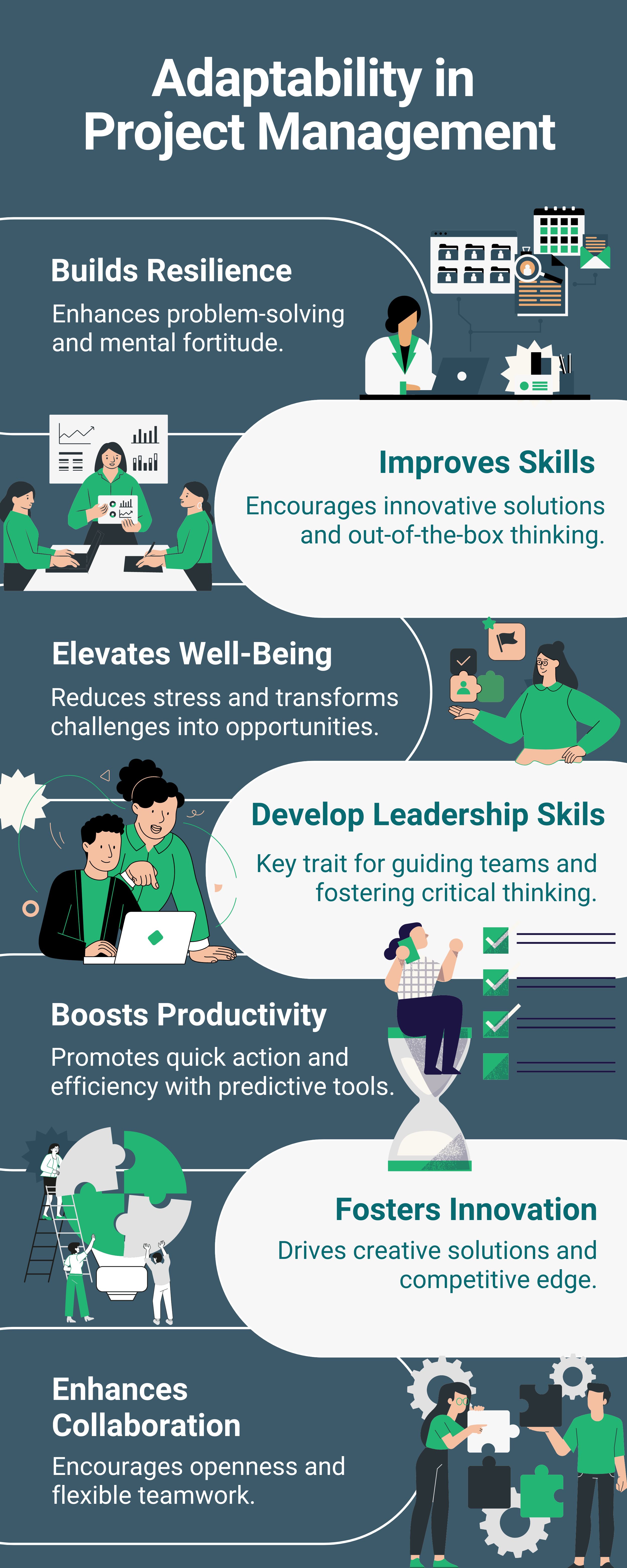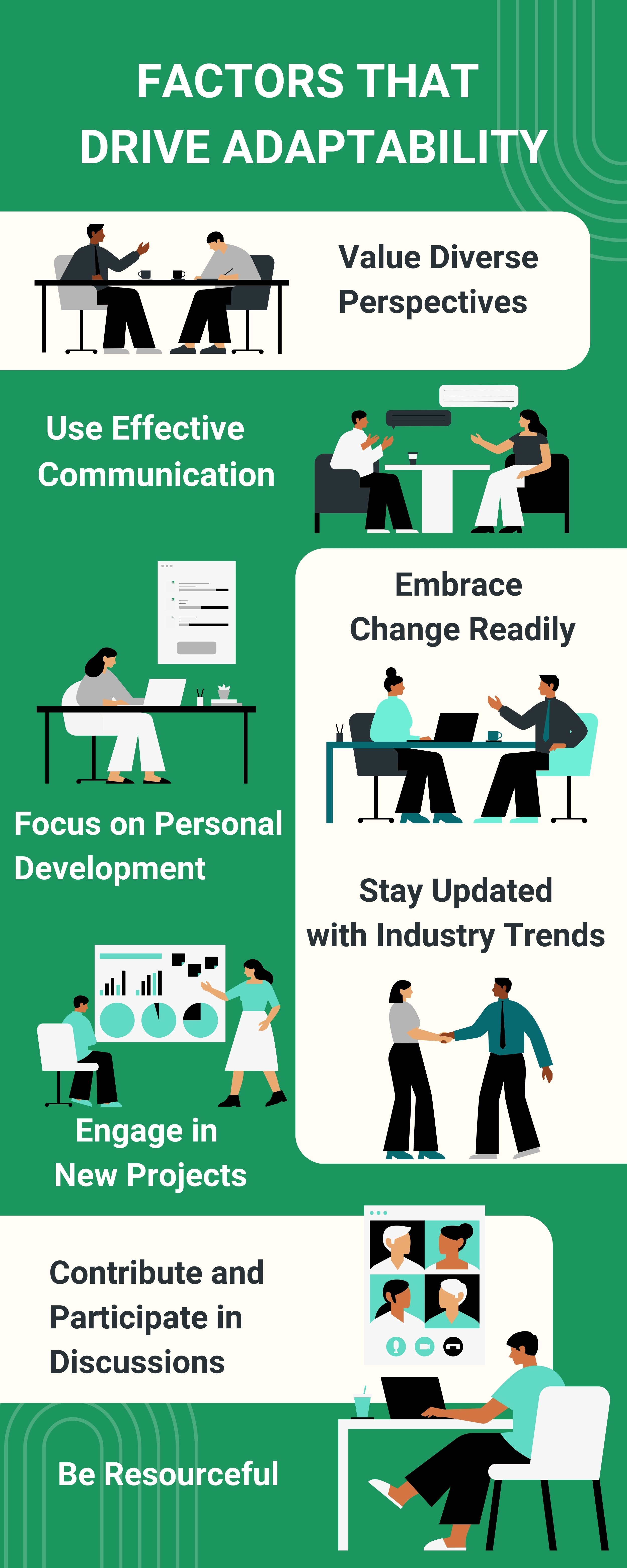
Adaptability in the workplace is no longer optional; it's essential. In the modern business environment, the ability to pivot and stay agile is what sets true leaders apart. It's no surprise that adaptability ranks among the top qualities sought by businesses today. The recent years have driven home one vital lesson - adaptability in the workplace is paramount for professional growth, stress management, and resilience. This isn't just about weathering the storm—it's about emerging stronger and more capable.
In project execution, no challenge is insurmountable if you are adaptable. This vital skill not only makes you a more compelling job candidate but also a more effective professional. Embracing new environments, mastering new methods, and tackling new tasks are all part of building adaptability. Moreover, boosting adaptability enhances other critical soft skills, like interpersonal and communication abilities. In project management, leveraging predictive AI can amplify adaptability, keeping you ahead of the curve and driving project success. This article discusses the importance of adaptability in the workplace, outlines essential skills, explores its benefits, and offers practical tips to enhance your adaptability easily.
Understanding Adaptability in the Workplace and Why It’s Important
Adaptability in the workplace is more than just flexibility; it's the ability to respond dynamically to changing demands. As Charles Darwin famously said, “It is not the strongest or the most intelligent who survive but those who can best adapt to change.” This crucial skill involves swiftly pivoting strategies, anticipating trends, and seizing unexpected opportunities, particularly in project management. Technological innovations and globalization continuously disrupt industries in today's fast-paced work environment, making adaptability a key success factor. Professionals must possess technical expertise and the agility to navigate uncertainty and rapid change within projects.
- Embracing Change Proactively - To truly embrace adaptability in the workplace, one must understand both oneself and others. Emotional intelligence is vital here. Being aware of and managing one’s emotions, as well as understanding others' feelings, significantly influences thoughts and behaviors. This emotional awareness helps in navigating uncertainties with resilience, essential for project management success.
- Enhancing Communication and Relationships - High emotional intelligence enables individuals to communicate effectively across diverse teams and build stronger relationships. Integrating emotional intelligence into adaptability enables professionals to face challenges with agility and support others through change. Such skills are indispensable in managing projects and leading teams.
- Strategic Advantage and Career Growth - In today’s dynamic workplace, where unpredictability is the norm, emotional intelligence is not just a soft skill but a strategic advantage. By embracing change and proactively seeking growth opportunities, adaptable professionals become invaluable assets to their employers. This adaptability fosters a culture of resilience within teams, enabling organizations to weather challenges and emerge stronger.
- Predictive Project Management - Predictive project management solutions enhance adaptability by forecasting potential challenges and optimizing workflows. This proactive approach allows project managers to adjust strategies efficiently, ensuring project success and organizational resilience.
Why Employers Value Adaptability
Employers increasingly prioritize adaptability in workplace candidates, recognizing its critical role in fostering resilience and innovation. Adaptable professionals drive success in project management and contribute significantly to their organization's growth and stability.
Essential Skills for Adaptability in the Workplace for Project Managers
- Embracing New Technologies and Methods - Adaptability in the workplace involves quickly learning new tasks, technologies, and procedures. For project managers, this means adopting new technologies and processes, such as AI solutions, to streamline project management and enhance efficiency.
- Handling Uncertainty with Ease - Managing uncertainty and unpredictability is crucial. Effective project managers pivot their strategies based on changing circumstances and maintain emotional control, leveraging data from project management software to measure and improve their adaptability.
- Adjusting to Physical Changes - Physically oriented adaptability refers to adjusting to changes in the physical environment, which is vital for project managers working on-site or on international projects. This includes adapting to different climates and physical demands.
- Innovative Problem-Solving - Creative problem-solving is a key adaptability skill. Project managers must think outside the box, collaborate effectively, and utilize diverse technology solutions and expertise to overcome challenges and capitalize on opportunities.
- Crisis Management and Stress Handling - Adaptable project managers maintain clarity and emotional control during emergencies by combining crisis management with stress handling. This adaptability is intertwined with risk management, essential for successful project execution.
- Effective Interpersonal Communication - Adaptability is crucial for project managers of diverse teams. This involves empathy, active listening, and adjusting communication styles to foster positive relationships and collaboration.
- Cultural Sensitivity - Demonstrating cultural adaptability is increasingly important in today’s globalized workplace. Project managers must understand and respect cultural differences, using empathy to integrate diverse values and customs into their teams.
- Leadership Excellence - Leadership performance is a critical measure of adaptability in project management. This includes financial performance, customer satisfaction, and team morale. Predictive project management solutions can improve leadership by providing insights into team dynamics and project outcomes.
Professionals can effectively navigate challenges and drive successful project outcomes by mastering these adaptability dimensions in the workplace, particularly in project management.
Benefits of Adaptability in the Workplace
Change is inevitable, and adaptability in the workplace is crucial for navigating it effectively. Here are some key benefits of being adaptable, especially in the realm of project management:
- Builds resilience to face various
 challenges and developing unique solutions hones your problem-solving skills and rewires your brain to handle any situation. This mental fortitude is invaluable in project management.
challenges and developing unique solutions hones your problem-solving skills and rewires your brain to handle any situation. This mental fortitude is invaluable in project management. - Improves skills and allows individuals to stand out in the workplace. Instead of succumbing to stress or feeling overwhelmed, they find new approaches and solutions. Brainstorming and thinking outside the box become second nature, making them the go-to person for complex projects.
- Elevates well-being by reducing work-related stress. As you become more adaptable, finding solutions becomes easier, leading to a more optimistic outlook. Challenges that once caused anxiety may become exciting opportunities.
- Develops leadership skills that enable you to guide your team through various challenges, foster critical thinking, and communicate effectively by understanding individual differences. These qualities are essential for effective project management.
- Boosts productivity with a proactive approach, allowing you and your team to focus on moving projects forward efficiently. Predictive project management solutions can further enhance this by anticipating potential issues and optimizing workflows.
- Fosters innovation and encourages innovation. By embracing change and new ideas, you can drive creative solutions and improvements in project execution, staying ahead in a competitive landscape.
- Enhances team collaboration by being open to different perspectives and adjusting one's approach to fit the situation. This fosters a collaborative environment, essential for successful project management.
Embracing adaptability in the workplace enhances your professional growth and drives successful project outcomes.
8 Tips to Develop Adaptability Skills in 2024
 Cultivating adaptability in the workplace involves honing diverse skills and mindsets. From valuing diverse perspectives to staying updated with industry trends, these strategies will empower you and your team to thrive amid change. Here are eight essential tips for developing adaptability skills effectively:
Cultivating adaptability in the workplace involves honing diverse skills and mindsets. From valuing diverse perspectives to staying updated with industry trends, these strategies will empower you and your team to thrive amid change. Here are eight essential tips for developing adaptability skills effectively:
- Value Diverse Perspectives - Listen to other viewpoints to enhance adaptability. Embrace new ideas and foster a culture where employee suggestions are valued, leading to continuous improvement in projects and management.
- Utilize Effective Communication - Use the right tools to gather detailed feedback for implementing change. Email, text, and instant messaging help collect actionable data and foster a transparent workplace.
- Embrace Change Willingly - Regularly evaluate and overhaul outdated processes. Openness to change is key to identifying improvements and staying competitive.
- Focus on Personal Development - Proactively develop your skills and identify future needs for your team. Continuous learning prepares your team for new challenges and enhances adaptability.
- Engage in New Projects - Apply your skills in real-world scenarios. Volunteering for new projects builds confidence and demonstrates your ability to manage diverse requirements effectively.
- Contribute Ideas and Participate in Discussions - Share your ideas and engage in discussions. Navigating differing opinions and building consensus develop adaptability within your team.
- Stay Updated with Industry Trends - Keep up with industry trends and tools to reduce the learning curve when adopting new methods. Regular training and staying informed prepare your team for new projects with confidence.
- Be Resourceful - Make the best use of existing tools and methods. Innovate within current constraints to ensure continuous improvement and effective project management.
Conclusion
Adaptability in the workplace is more than a survival skill; it's a strategic advantage that propels organizations forward. Embracing diverse perspectives, leveraging effective communication tools, and committing to personal development is fundamental to thriving in a constantly evolving business landscape. You can continually enhance your adaptability and drive innovation by actively engaging in new projects and staying abreast of industry trends.
Modern predictive solutions can significantly elevate adaptability in the workplace by forecasting potential challenges and optimizing workflows. TrueProject is an invaluable solution for fostering adaptability in project management. This KPI-based predictive project management solution improves project health and performance through automated oversight and governance. By leveraging advanced warning systems, predictive intelligence, and AI, TrueProject identifies potential issues before they escalate, ensuring projects stay on track and within budget. Embracing TrueProject's capabilities can empower your team to navigate uncertainties effectively, enhancing overall adaptability and driving successful project outcomes.
For more information on TrueProject at trueprojectinsight.com

About the Author:
Nisha Antony is an accomplished senior marketing communications specialist at TrueProject and a leader in predictive intelligence. With over 16 years of experience, she has worked as a Senior Analyst at Xchanging, a UK consulting firm, and as an Internal Communications Manager on a major cloud project at TE Connectivity.
She is an insightful storyteller who creates engaging content on AI, machine learning, analytics, governance, project management, cloud platforms, workforce optimization, and leadership.
Endnotes
- Recognize Team. “Adaptability in the Workplace - Defining and Improving This Key Skill – Recognize.” Recognize: (n.d.) https://recognizeapp.com/cms/articles/adaptability-in-the-workplace-defining-and-improving-this-key-skill
- LinkedIn Team: “Tips for Improving Adaptability in the Workplace.” LinkedIn: (n.d.) https://www.indeed.com/hire/c/info/adaptability-in-the-workplace
- Olivier Chauvin. “9 Secrets to Unleash Adaptive Habits - Your Key to Project Management Mastery.” Quire: Dec 27, 2023. https://quire.io/blog/p/adaptive-habits.html
- Alicia Raeburn. “6 ways to develop adaptability in the workplace and embrace change.” Asana: Jun 21, 2024. https://asana.com/resources/workplace-adaptability-skills
- Sezen Birkan. “The 8 Dimensions of Adaptability for Project Managers.” PsoHub: Jun 28, 2024. https://www.psohub.com/blog/the-8-dimensions-of-adaptability-for-project-managers
- Levi Olmstead. “Adaptability in the Workplace: Benefits, Skills, Tips (2024).” WhatFix: Oct 01, 2021. https://whatfix.com/blog/adaptability-in-the-workplace/





